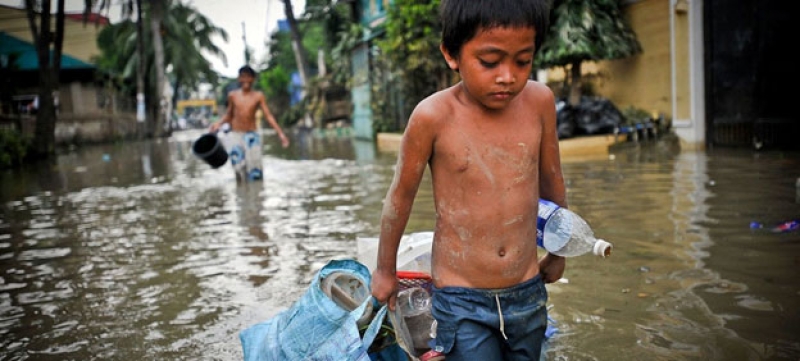- India Sees 9% Drop in Foreign Tourists as Bangladesh Visits Plunge |
- Dhaka Urges Restraint in Pakistan-Afghan War |
- Guterres Urges Action on Safe Migration Pact |
- OpenAI Raises $110B in Amazon-Led Funding |
- Puppet show enchants Children as Boi Mela comes alive on day 2 |
6 of 9 Planetary Boundaries Crossed; Action Needed Beyond Govt

A boy drags possessions through the flooded streets of Manila in the aftermath of a typhoon. Credit: ADB
Nearly ten years after the Paris Agreement — a legally binding commitment to reduce greenhouse gas emissions — the gap between climate goals and government actions remains stubbornly wide.
The consequences are real: 2024 saw 150 extreme weather events, leading to the highest number of new population displacements recorded in the past 16 years, raised food prices, and hundreds of billions in damages. March 2025 was the warmest March on record in Europe.
Climate stability is only one of nine planetary boundaries critical for long-term human survival. While governments have shown that international cooperation is possible — the Montreal Protocol on ozone-depleting substances being a notable success — most environmental indicators are moving in the wrong direction.
Scientists agree: current policies are not keeping pace with accelerating environmental degradation. Six planetary boundaries have already been crossed, and more are at risk, including those related to biodiversity, freshwater systems, and ocean acidification. The world remains far from meeting the UN Sustainable Development Goals.
This trend isn’t new, and it predates the U.S. withdrawal from the Paris Agreement and environmental rollbacks in other countries. Political commitments are often insufficient and frequently elusive.
Safeguarding our planet must therefore go beyond governments. Change requires decisions at every level: mayors, business leaders, civil society, youth, Indigenous Peoples, faith communities, and households all have roles to play.
Even daily choices — what we eat, how we travel, how we manage waste — shape environmental outcomes. These decisions reflect diverse knowledge systems that can strengthen policy both technically and socially. Nature itself may also be viewed as a stakeholder in decision-making: recognising its dynamics leads to better outcomes.
The UN Environment Programme’s Global Environment Outlook (GEO-7), to be launched at the 7th UN Environment Assembly in December 2025, will highlight this broader, behaviour-focused approach. It is asking: How can we engage stakeholders effectively?
Fortunately, inspiring examples already exist. Costa Rica offers a case of transformational change in societal values. The country aligns its national budget with public and planetary health, prioritising these over GDP-based decisions.
High investments in health and education have generated high levels of well-being and longer life expectancy. Forest cover increased from 21 per cent in the 1980s to 50 per cent today, and almost all electricity now comes from renewable energy sources.
In Rosario, Argentina, civic participation drives urban transformation. Participatory budgeting has improved informal settlements and fostered a thriving urban agriculture movement. Citizen involvement has enhanced equity, created jobs, and improved food security.
In recent years, Bogotá, Buenos Aires, Lima, and São Paulo have recognised waste pickers as essential service providers. This has improved recycling and plastic waste management while promoting dignity and justice for marginalised communities — advancing the circular economy in the process.
In Andhra Pradesh, India, millions of farmers are part of the Zero Budget Natural Farming initiative, reviving traditional, chemical-free agricultural practices. It represents one of the world’s largest agroecological transitions.
With nearly six out of ten humans living in cities, the climate leadership of networks like C40 — comprising nearly 100 mayors — offers vital solutions.
Crises have sparked innovation too. During the COVID-19 pandemic, London’s food insecurity was exposed, catalysing the formation of resilient urban food governance networks, including zero-waste initiatives.
Ecological transformation must now happen at unprecedented speed. For it to succeed, it must be co-produced by society — embracing diversity in demographics, as well as in knowledge systems, including Indigenous wisdom, the arts, and science.
We already possess many of the technologies needed: we know how to boost crop yields, decarbonise economies, and feed more people with fewer resources, using far less land and water.
Despite declining support for environmental protection from certain governments, the cases above demonstrate the power of participatory processes in building a sustainable future. They prove that meaningful, inclusive progress is possible.
The crises of climate change, nature loss, land degradation, and pollution — the terrifying trajectory of crossing planetary boundaries — underscore the urgency of equitable inclusion.
Let’s not leave transformation to governments alone. The responsibility — and the power — is shared.
Audrone Telesiene is a lead author of the 7th edition of the Global Environment Outlook (GEO-7) and a professor of sociology and communication sciences at Kaunas University of Technology, Lithuania.

